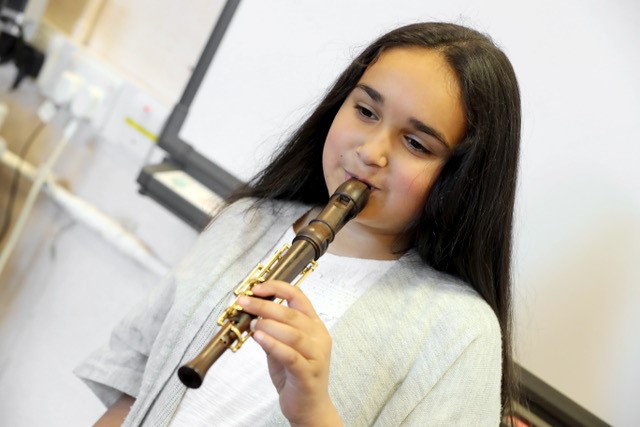
Inclusive instruments
For some children with physical disabilities, access to music making is barred by a lack of well-designed adapted musical instruments. Rachel Wolffsohn explains what a new charity is doing to change that.
Just before the snap election was announced, Schools Minister Nick Gibb raised the issue of the exclusion of disabled people from national music teaching in a letter to Arts Council England. This followed a meeting between him and Stephen Hetherington, founder and trustee of the One Handed Musical Instrument (OHMI) Trust, at which Stephen had explained something quite basic: without instruments of the same type and musical quality as those commonly used, real inclusion was impossible.
Without instruments of the same type and musical quality as those commonly used, real inclusion was impossible
It was Stephen’s own hemiplegic daughter who alerted him to the lack of instruments available to disabled musicians. In 2011 he set up the charity with Martin Dyke with the stated objective of removing the barriers to music-making faced by the physically disabled – an objective to be achieved through the development and production of suitable musical instruments.
Annual competition
OHMI’s instruments are sourced primarily through the annual OHMI competition. The challenge of the competition is to create or adapt instruments so they can be played without the use of one hand and arm, and without limiting their potential for virtuosity. The winning technical solutions can then be reworked for a variety of physical disabilities.
Over the five years of the competition, entries have been received from around the world in all the competition categories: Playable – for instruments playable without further development; Enabling – for equipment that makes a standard instrument playable, such as a harness or stand; and Concepts – for ideas that need development.
The instruments and equipment we have acquired include many of the brass family, flutes, a clarinet, saxophones, a recorder, a guitar and even bagpipes. We have also awarded Playable prizes to two electronic instruments, the LinnStrument and the Chapman Stick, and a special Innovation award to OpenUp Music in South West England for the clarion.
Now the Trust has an increasing number of instruments to work with, we are collaborating with music hubs, schools and colleges to teach them.
While OHMI concentrates on physical disabilities, we also collaborate with other organisations. OpenUp Music works with young disabled people, many of whom have very complex needs. Each of the organisations working with music and disability has a part to play. We focus on full inclusion and recognise that for many disabled people it is only the design of instruments that forms the barrier to participation.
One-handed recorder
Our work is profoundly affecting disabled people, even at the start of their music life. Take Aniyah, who was in year four when she joined the OHMI teaching project. She was born with cerebral palsy and without full use of her right hand. Each year, her school offered the fife (similar to the piccolo) as a Wider Opportunities musical instrument, but with her disability she struggled to keep up with her peers.
For Aniyah, learning the one-handed recorder allowed her to join in with the Wider Opportunities music lessons, as well as to receive one-to-one tuition, and even progress beyond her classmates.
Aniyah’s story is similar to all our students who have never had the opportunity to learn a musical instrument before, or have felt sidelined by the options currently offered in school music lessons. Performing with others also enables children to develop social, learning and emotional skills.
The OHMI teaching project proved that adapted instruments can provide a path to full inclusion, if the right instruments can be made available to schools and their disabled pupils.
Significant funding
To achieve equal participation for disabled people requires significant funding. This is not something that can be ignored if we are serious, morally and politically, about inclusion. Yet, as our work is comparatively new, many funding routes are closed to us, either by funder rules, practices, or simply by the lack of funds to support both existing clients and new initiatives.
With funding, we plan to develop our work across three fronts:
- Work with instrument makers, music technologists, and those in the disabled community, to find and develop effective instruments that meet their needs and our criteria.
- Research into instrument manufacturing methods, including 3D printing, currently the subject of research in partnership with Birmingham City University.
- Extend gradually our teaching programmes across the country and abroad.
Rachel Wolffsohn is General Manager at OHMI.
www.ohmi.org.uk
Tw: @TheOHMITrust
Join the Discussion
You must be logged in to post a comment.